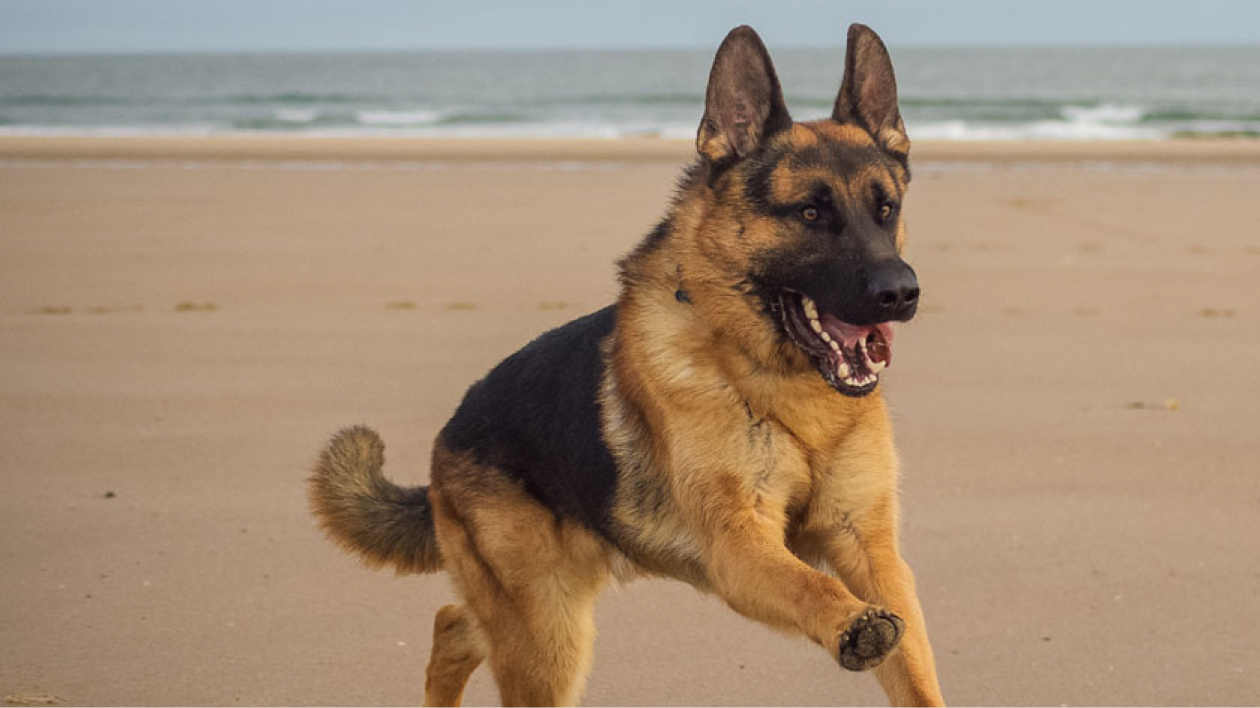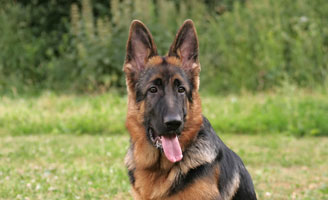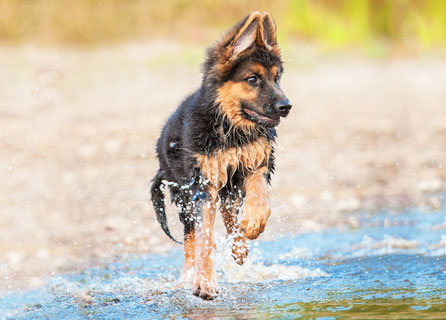
German Shepherd breed guide
German Shepherds are large, loyal and always willing to learn. Learn more about this smart, athletic dog, from their grooming and exercise needs, to the things you can do to keep them happy and healthy.
Breed information and advice
The German Shepherd, also known as an Alsatian, belongs to the pastoral or herding group and is strong and sporty. They're one of the most popular breeds in the world and need an owner who can keep them company and make sure they get plenty of exercise. Here's more you should know:
- Highly intelligent, strong and alert, the German Shepherd shouldn’t be left alone for long periods as they can experience anxiety. They're happiest with their family around them, and with access to a large garden where they can let off steam.Highly intelligent, strong and alert, the German Shepherd shouldn’t be left alone for long periods as they can experience anxiety. They're happiest with their family around them, and with access to a large garden where they can let off steam.
- A German Shepherd’s medium-length double coat will need brushing two or three times a week.A German Shepherd’s medium-length double coat will need brushing two or three times a week.
- Fully grown, they will typically weigh between 34kg and 43kg.Fully grown, they will typically weigh between 34kg and 43kg.
- If healthy they will usually live between 10 and 14 years.If healthy they will usually live between 10 and 14 years.
Typical size of a German Shepherd: Medium: 56cm-66cm

Recommended exercise and nutrition
Your German Shepherd will take well to training and shine in agility classes as this is a breed that needs a lot of exercise. You'll need to take them on one or two long, brisk walks every day, and as they love to be mentally challenged you might want to take a ball or Frisbee along with you. Your dog probably won’t take kindly to being left alone for long periods of time, so be sure to schedule playtime with them.
When it comes to mealtimes they need plenty of protein in their diet. The exact amount will vary depending on the size and age of your dog, exercise levels and the type of food they're getting - always read the label for advice.
More than two hours of exercise per day
Your German Shepherd has a lot of energy to burn off - playtime will be fun for both of you, but if they're on a lead, be wary of everything around you as they're big and strong and will pull you along if they spot something of interest.

Common health problems and illnesses
Your German Shepherd will need all of the usual vaccinations and check-ups to help protect them against common ailments. There are some conditions which this breed is more prone to though, and you may want to familiarise yourself with the symptoms, so you know what to look out for.
Arthritis and other issues with the joints including degenerative joint disease, and conditions like hip or elbow dysplasia. Hip dysplasia is where the ball and socket of the dog’s hip don't fit properly leading to the deterioration of the bone and loss of function of the joint. This damage causes swelling, pain and arthritis so it’s vital to identify the disease as early as possible to be able to manage or avoid discomfort for your dog. Look out for symptoms including lameness, which can be painful. Treatment can control and manage the pain, or surgery might be needed.
Exocrine Pancreatic Insufficiency is where the pancreas doesn't release the digestive enzymes that allow food to be broken down and absorbed. The two main warning signs of pancreatic enzyme insufficiency are ongoing diarrhoea and rapid weight loss.
Degenerative myelopathy is a debilitating spinal disorder that is most commonly recognised in German Shepherds. It’s a progressive, incurable, disease of the nerves of the spinal cord which causes gradual loss of mobility and loss of feeling in the limbs. Affected dogs become paralysed first in the hind limbs and then in the forelimbs. The condition doesn’t cause pain but it will lead to your dog being unable to behave or function normally which is likely to have a detrimental impact on their welfare.
Find out about insurance for your German Shepherd
Learn how pet insurance works and what kind of cover you might need for your dog.
Grooming advice
German Shepherds are double coated, protecting them from rain and snow, thanks to their breeding history of herding flocks whatever the weather, but coats can vary in length. Your dog will shed all year round, and brushing two or three times a week should help to keep their fur under control and ensure their hair is kept shiny.
Bathing should only be done when it’s absolutely necessary, as washing them too often can bring about skin irritation from stripping the coat of its natural oils.
Check and clean your dog’s ears frequently, and their nails will also need to be clipped on a regular basis - and this includes the dew claws (the ones growing on the inside of the front legs).
It’s advisable that you get your German Shepherd used to grooming right from being a puppy if possible, so it becomes a routine they know and love.
Fun and interesting facts
- This breed is one of only a few whose official name includes the word ‘dog’ - this was to differentiate between them and a human German Shepherd.
- This breed is popular with famous celebrities including Jake Gyllenhaal.
- Your dog is likely to be very protective of you, and you will need to socialise them to be welcoming of strangers.
- Breeder Max von Stephanitz came across the wolf-like dog in 1889 and, impressed by its intelligence and agility, set up the ‘German Shepherd Dog Club’.
- A German Shepherd called Filax of Lewanno was honoured in 1917 for rescuing 54 soldiers in WWI.
Important information
The content on this page aims to offer an informative introduction to pet breeds, but does not constitute expert veterinary advice. If your dog or cat falls ill or has an injury, contact your vet immediately.
All facts and figures were correct at date of publication and were compiled using a range of sources.
Discover more breeds
Browse our other cat and dog guides to learn about some of the UK’s most popular breeds.